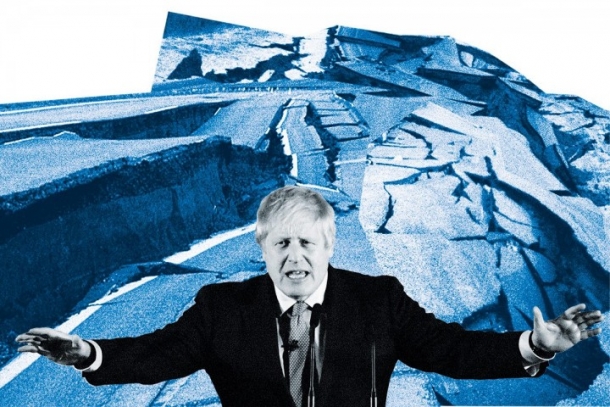The election victory for Boris Johnson opens up a new, convulsive chapter in Britain. Rather than stabilise the situation, as the capitalist commentators believe, it will further intensify this epoch of instability. We are in a period of sharp and sudden changes, which is a reflection of the deep crisis of capitalism today.
At the moment, the strategists of capital are crowing at the demise of Corbyn, the Labour Party and socialism. “Jeremy Corbyn and his allies had vowed to build a socialist utopia in the UK but those dreams now stand in smoking ruins after the worst setback for the Labour party in nearly a century,” states the Financial Times.
One stupid Tory MP said the defeat for the “Marxist” Labour Party was equivalent to the “collapse of the Berlin Wall”, which even Andrew Neil had to laugh about.
In fact, this “collapse” is wishful thinking on their part. In the words of Mark Twain, “The reports of my death are greatly exaggerated.” The election was simply a snapshot of the mood, heavily influenced by Brexit.
Brexit
In fact, although the party has fewer seats now, Labour won a bigger vote share this time around than in 1983, and Corbyn won more votes than Blair did in 2005. The Tory’s vote only increased by one percent over 2017. But the parliamentary arithmetic has given the Tories a sizable majority.
The fundamental reason why Johnson won was Brexit, but this could also be his downfall. He has conjured up expectations, not only over Brexit, but other things too, which he will not be able to deliver on. He will betray all those who lent him their vote.
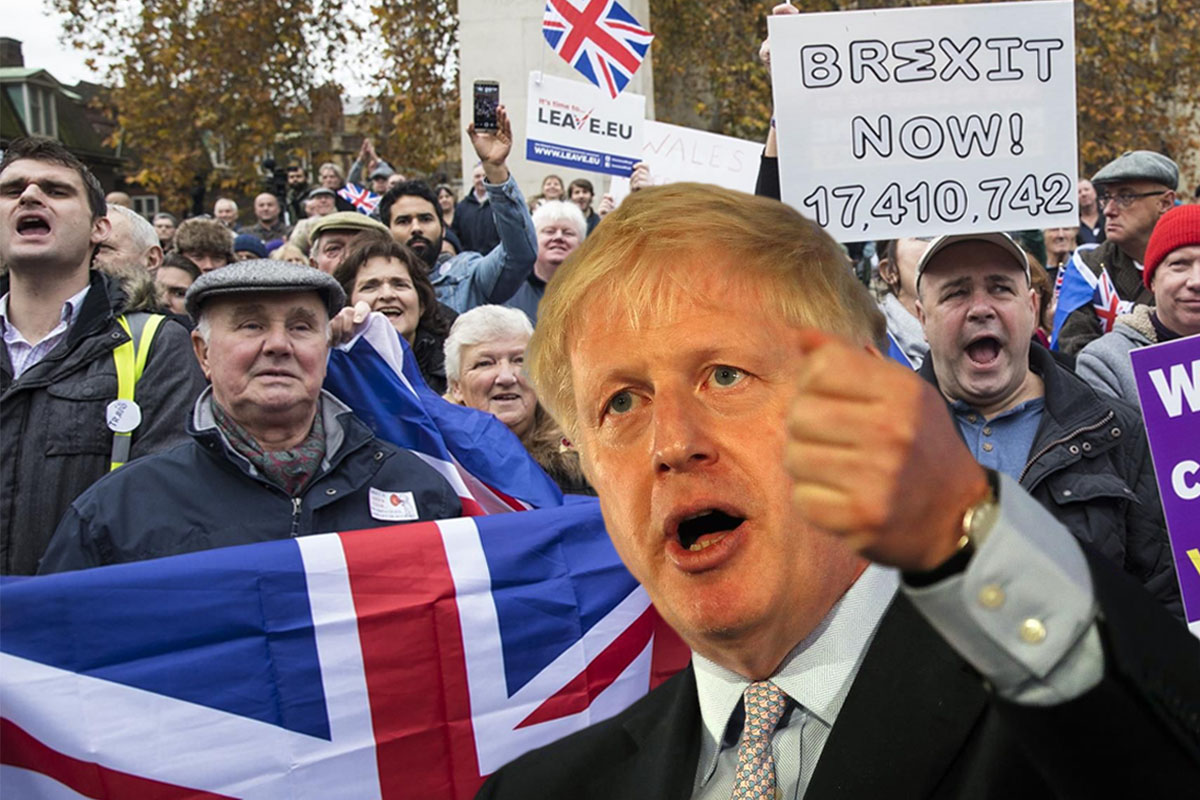 Johnson won on Brexit, but it could be his downfall / Image: Socialist Appeal
Johnson won on Brexit, but it could be his downfall / Image: Socialist Appeal
Forcing through the Withdrawal Bill at the end of January is not the end of the matter, but only the beginning. “Get Brexit Done” is only the divorce – that is, simply leaving the EU. The hard part is the future trading relationship with Europe, which they have ignored, promising an agreement will be done by the end of the year.
Ivan Rogers, Britain’s former ambassador to the EU, warned of “the crisis that is likely to confront us at the Christmas yet to come — Christmas 2020”. There is no way that a Johnson government will be able to negotiate a trade deal in a matter of months. The EU deal with Canada took seven years. Trade experts have estimated the timetable for negotiating for a UK-EU deal will take some five to seven years to complete. The talks will take place to the beat of a ticking clock.
A “quick and dirty” trade deal focused on removing tariffs and quotas would delight the EU27, which enjoyed a £96bn surplus in trade in goods with the UK in 2018. Services, Britain’s biggest export strength, would barely be covered. The EU would insist on “level playing field” provisions to prevent the UK undercutting its neighbours with aggressive deregulation and — in a highly sensitive political battle to come — it would demand access to Britain’s fisheries.
“If this heroic optimism is misplaced, Mr Johnson could face a crisis,” states the Financial Times. If no acceptable deal is in place he could either seek an extension to the transition deal and risk the wrath of Tory Eurosceptics, or leave without a trade deal and fall over an economic cliff-edge. Or, as Sir Ivan predicts, Boris Johnson could be forced to grab a substandard deal from the UK perspective and try to sell it.
A trade deal with the United States will also be difficult, thanks to the relative unpopularity in the UK of US president Donald Trump, and the typically aggressive US approach to trade talks, according to Sam Lowe, of the Centre for European Reform.
“But negotiating it in parallel with the EU negotiations and others raises questions about government capacity. It is very unusual to conduct so many negotiations at once,” he added.
The present transitional period will end in December 2020, unless Britain asks for another extension by the summer, which the Tories have ruled out. This would leave the door open to a no-deal Brexit at the end of the year, which the Brexit hardliners would support. This will provoke a new crisis of epic proportions.
Economic crisis
The new Boris Johnson government will be a government of crisis. The economy is in bad shape, with investment falling and growth stagnant. He will have little room for manoeuvre. In the words of Sir Robert Walpole, while the Tories are ringing their bells now, tomorrow they will be wringing their hands. Now they have a big parliamentary majority, which provides them with no excuses.
The more Johnson’s lies are exposed for what they really are, the more hatred will build towards the Tories. He has promised more spending, but as the economy declines, he will be forced to introduce more austerity. The Tories have been in power for the last decade – a decade of austerity and falling living standards. It will be more of the same. As a consequence, there will be a deep feeling of betrayal, the likes of which we have not seen before.
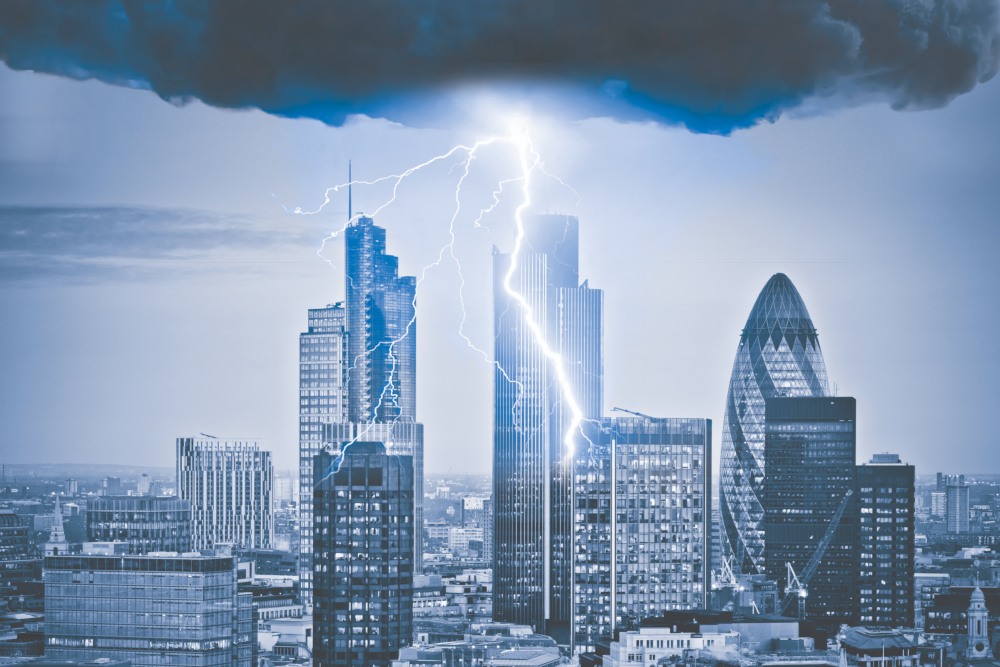 The coming economic downturn will have dramatic consequences, laying the basis for revolutionary convulsions / Image: Socialist Appeal
The coming economic downturn will have dramatic consequences, laying the basis for revolutionary convulsions / Image: Socialist Appeal
Given the extreme volatility, there will be sharp shifts to the right, which will be followed by even sharper shifts to the left. Workers are desperately looking for a way out and are trying one thing then another.
Within months of the defeat of 1931, which was a real debacle, where Labour was reduced to 52 seats, the ILP led a left-wing split away from Labour. Nevertheless, within a year, Trotsky was talking of a pre-revolutionary situation in Britain.
Talk of a Johnson government lasting two terms is laughable. He probably will not last a full term given the crisis of British and world capitalism. Johnson will eventually “die in a ditch” politically.
A major factor in the demise of the Johnson government will be the coming world slump. At the moment, the world situation is extremely precarious. Trump, who is pursuing ‘America First’, has launched an aggressive trade policy, with tariffs imposed or threatened against China, Mexico, Brazil, France and the EU. Reprisals are threatened or being imposed. This has all the elements of a trade war, with potentially devastating consequences. Even without this, the world economy is slowing down and we are on the verge of a new economic collapse.
Brussels has cut its growth forecasts for the eurozone to their lowest level since the height of the bloc’s sovereign debt crisis, warning the slowdown will persist for at least the next two years. The European Commission reduced its annual projection for eurozone GDP growth to 1.1 per cent for 2019.
Of the eurozone’s major economies, Italy will suffer the worst growth rate at just 0.1 per cent in 2019, rising to 0.4 per cent next year. France’s expansion is projected to stabilise at 1.3 per cent in 2019 and 2020. Germany’s economic growth is expected to rebound from 0.4 per cent in 2019 to 1 per cent in 2020 and 2021.
“Global growth is set to fall this year to a pace usually associated with the brink of recession,” warned the European Commission forecast. “Economic activity now looks set to slow down in a number of member states, which at first appeared immune,” the commission said. “As the slowdown spreads, labour markets will lose steam. Wage growth may already have stopped increasing, leaving core inflation at persistently low levels.”
Mervyn King, the former governor of the Bank of England, said the world economy was stuck in a low growth trap and that the recovery from the slump of 2008-09 was weaker than that after the Great Depression.“Following the Great Inflation, the Great Stability and the Great Recession, we have entered the Great Stagnation,” he said. He then went on to say that the world faces a new “financial Armageddon”.
The coming downturn will have dramatic consequences, laying the basis for revolutionary convulsions internationally, as well as in Britain. In the political and economic storms that impend, the Johnson government will be cast to the four winds, preparing the way for a convulsive shift to the left.
Labour’s Future
As predicted, it didn’t take long after the election defeat for the Blairites to get the knives out. Ian Murray, the only Labour MP left in Scotland, and a committed Blairite, tweeted: “Every door I knocked on, and my team and I spoke to 11,000 people, mentioned Corbyn. Not Brexit but Corbyn. I’ve been saying this for years. The outcome is that we’ve let the country down and we must change course and fast.” He said Labour “must respond or this party will die” and that Corbyn “was nothing short of toxic.”
In fact, it is the opposite. It is the toxic legacy of Blairism, not Corbyn, that has reduced the Labour Party to a single MP north of the border, in effect killing it.
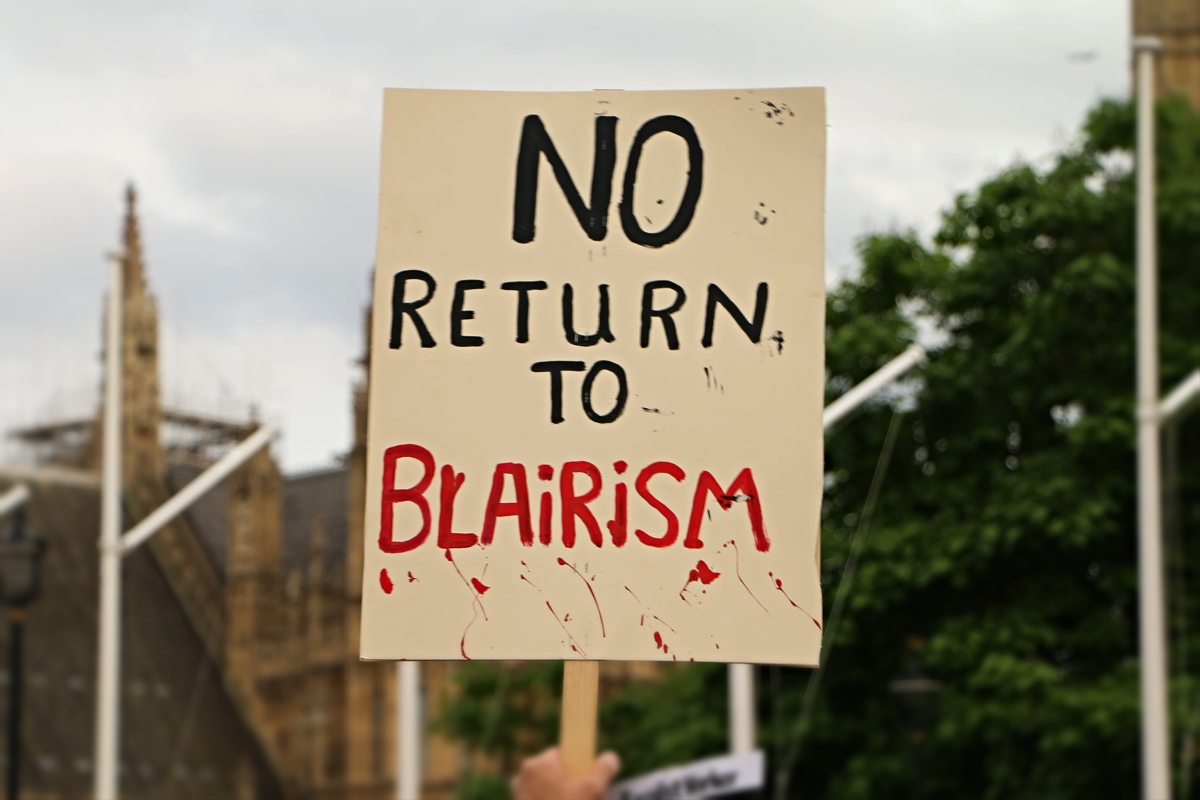 The Blairites are in a weak position, despite the full support of the ruling class. Nevertheless, we must not take anything for granted / Image: Socialist Appeal
The Blairites are in a weak position, despite the full support of the ruling class. Nevertheless, we must not take anything for granted / Image: Socialist Appeal
The Blairites, backed by the media, began a concerted campaign to remove Corbyn and put an end to this “Corbyn revolution” within the Labour Party. Using the most vitriolic language, they are demanding that the Labour leader stand aside immediately. The right wing hope to destroy the movement and seize back control.
The former Blairite cabinet minister Alan Johnson complained that Corbyn “couldn’t lead the working class out of a paper bag”. This has provoked all out war in the Labour Party, as the right-wing try to reassert their domination. But the mass membership are not going to throw everything away.
These Blairite careerists played a disgusting role during the election, undermining Corbyn at every opportunity. They were the ones who blew up out of all proportion the allegations of antisemitism and instigated a witch-hunt against the left. They were prepared to stoop to any level to slander Corbyn and the Labour Party. They would be quite happy even if this was to destroy the Party – which it will not. For them, it is a question of “rule or ruin”.
Sadly, following the defeat, Corbyn has agreed to stand down, but not immediately, as has John McDonnell from the shadow cabinet. A battle for the leadership is in full swing, involving the election of leader and deputy leader. Over the coming weeks and months, this will shape the struggle for the future of the Labour party.
However, Labour’s right wing, which holds a majority in the PLP, has been in grave difficulties ever since Corbyn won the Labour leadership in 2015. Every attempt to oust him failed, and led to a further strengthening of the left. The left control the conference, the NEC, and officialdom. The Blairites have been on the back foot ever since. It meant the bourgeoisie, through the right-wing, had lost control over the Labour Party, a truly remarkable development.
This pessimism was reflected in an article by Martin Wolf of the Financial Times: “With Jeremy Corbyn’s leadership, the hard left took over the Labour Party. It was a change of enormous, and probably enduring, importance.”
The resignation of Tom Watson has also been a terrible blow to the right wing. His departure as deputy leader leaves the Blairites without a clear leader. The demoralisation of the Blairites had been highlighted by the earlier departure of Luciana Berger, Chuka Umunna etc., who all lost their seats. The Guardian quoted a “senior party figure” speaking of “a great sense of desolation and abandonment sweeping the moderates”.
This was also reflected in the right-wing Economist magazine:
“The combination of institutional power and ideological fashion means that the Labour Party is a killing field for moderate leadership candidates. Liz Kendall, who ran in 2015, was humiliated; Tristram Hunt decamped to run the Victoria and Albert Museum; Andy Burnham became mayor of Greater Manchester; and Chuka Umunna left to set up a new party.
"Tom Watson’s decision to give up both his job as deputy leader and his parliamentary seat to become a fitness instructor was born of despair. As champion of the party’s moderate wing, he crunched the numbers, which is his forte, and decided that the future was deepest red. Mr Watson is right. There will not be a Blairite dog in the coming leadership fight.” (13 December 2019)
The fight is nevertheless on, with no holds barred. The rank-and-file will not want anyone less than a full-blooded Corbynista. The right wing, meanwhile, are promoting “centrist” figures who can take the party back to the “centre ground”, such as Sir Keir Starmer and Emily Thornberry. If victorious, they will then put a Blairite in.
But the Blairites are in a weak position, despite the full support of the ruling class. We remember what happened to Owen Smith. Nevertheless, we must not take anything for granted.
Shifts in consciousness
Marx once explained that the working class sometimes needs the whip of the counter-revolution to push it forward. This will be the case with the Johnson government and the Blairite reaction inside the Labour Party.
The attacks from the Tories will galvanise the working class to take action, starting on the industrial plane. This will serve to radicalise the trade unions, as we have seen with the postal workers and railway workers.
In the Labour Party, the outcome is an open question – one will that be determined by a battle of living forces.
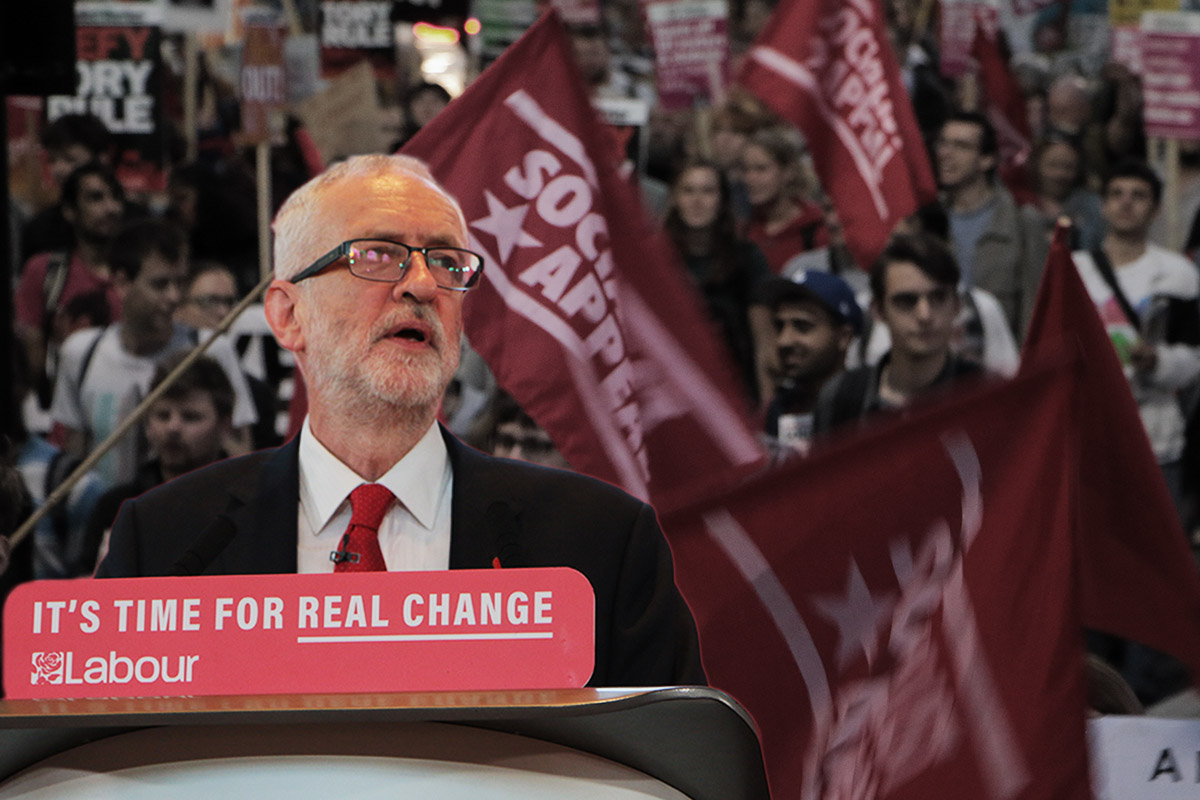 One way or another, the Labour Party be transformed and re-transformed in the period that lies ahead / Image: Socialist Appeal
One way or another, the Labour Party be transformed and re-transformed in the period that lies ahead / Image: Socialist Appeal
Given the confusion and compromise of left leaders such as Jon Lansman, it is not ruled out that a right-winger like Starmer could win. This would be a blow to the left, demoralising a layer of activists and paving the way for a shift to the right in the party.
Even then, however, any attempt to purge the left from the party and extinguish the Corbyn movement (for example, using the excuse of antisemitism) could provoke a huge response from grassroots activists. Angry members could even push for the introduction of mandatory reselection of MPs in such circumstances.
If the left wins the leadership contest, this would not be the end of the matter either. The right-wingers in the PLP would continue to sabotage a new left leader. Again, this would lead to calls from rank-and-file members to kick out the Blairites, who act as a Fifth Column in the party.
In either case, it is clear that the civil war in the Labour Party will rumble on in the months and years ahead. One way or another, the Labour Party will be transformed and re-transformed in the period that lies ahead. With capitalism in crisis, the material basis for Blairism and the "centre ground" is gone. Workers and youth are looking for a radical alternative, not a return to Blairism.
Events, events and more events will rapidly transform consciousness. There is no possibility of stability in Britain or internationally, as we see with revolutions breaking out from Chile to Sudan to Lebanon.
However, what the movement needs, above all in Britain, are clear ideas and perspectives. The reformist left have woolly ideas and little perspective of overthrowing capitalism. They have a rather short memory, whereas Marxism has a long memory. Marxism, which is the generalised historical experience of the working class, will play an essential role in pointing the way forward.
Theory is a guide to action. To prevent backsliding and setbacks, we urgently need to build the forces of Marxism so as to provide backbone to the movement; to provide determination and a clear perspective of how to change society. We urgently need to build a powerful Marxist tendency in Britain and internationally and to raise ourselves up to the tasks posed by history.

